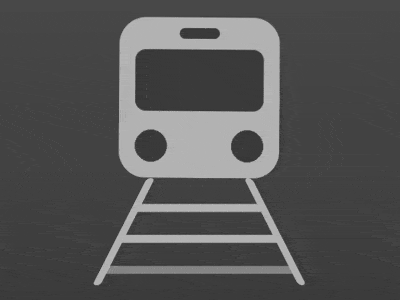
This article introduces you to the article about how to use pure CSS to realize a moving train. It has a good reference value. I hope it can help friends in need.

Define dom, the container contains 2 elements, train represents the train, track represents the railroad track, and the 3 <span></span> contained in it represent the 3 sleepers.
<p> </p><p></p> <p> <span></span> <span></span> <span></span> </p>
Centered display:
body{
margin: 0;
height: 100vh;
display: flex;
align-items: center;
justify-content: center;
background: linear-gradient(#666, #333);
}Define container size:
.loader {
width: 8em;
height: 10em;
font-size: 20px;
}Draw the train first.
Draw the outline of the train:
.train {
width: 6em;
height: 6em;
color: #444;
background: #bbb4ab;
border-radius: 1em;
position: relative;
left: 1em;
}Use the ::before pseudo element to draw the window:
.train::before {
content: '';
position: absolute;
width: 80%;
height: 2.3em;
background-color: currentColor;
border-radius: 0.4em;
top: 1.2em;
left: 10%;
}Use the ::after pseudo element to draw the signal light on the window:
.train::after {
content: '';
position: absolute;
width: 25%;
height: 0.4em;
background-color: currentColor;
border-radius: 0.3em;
top: 0.4em;
left: calc((100% - 25%) / 2);
}Use radial gradient to draw the lights:
.train {
background:
radial-gradient(circle at 20% 80%, currentColor 0.6em, transparent 0.6em),
radial-gradient(circle at 80% 80%, currentColor 0.6em, transparent 0.6em),
#bbb;
}Next draw the rails and sleepers.
Define the width of the rails, slightly wider than the train:
.track {
width: 8em;
}Use pseudo elements to draw the rails:
.track {
position: relative;
}
.track::before,
.track::after {
content: '';
position: absolute;
width: 0.3em;
height: 4em;
background-color: #bbb;
border-radius: 0.4em;
}Place the rails on both sides to create a visual sense of near and far. Effect:
.track::before,
.track::after {
transform-origin: bottom;
}
.track::before {
left: 0;
transform: skewX(-27deg);
}
.track::after {
right: 0;
transform: skewX(27deg);
}Draw the sleepers, which is the effect closest to the observer. Currently, the three sleepers are overlapping:
.track span {
width: inherit;
height: 0.3em;
background-color: #bbb;
position: absolute;
top: 4em;
}Set the animation effect of the railway track:
.track span {
animation: track-animate 1s linear infinite;
}
@keyframes track-animate {
0% {
transform: translateY(-0.5em) scaleX(0.9);
filter: opacity(0);
}
10%, 90% {
filter: opacity(1);
}
100% {
transform: translateY(-4em) scaleX(0.5);
filter: opacity(0);
}
}Set an animation delay for the other 2 sleepers to make the track look like it will never end:
.track span:nth-child(2) {
animation-delay: -0.33s;
}
.track span:nth-child(3) {
animation-delay: -0.66s;
}Finally, add an animation effect to the train to make it look like it is shaking slightly while running:
.train {
animation: train-animate 1.5s infinite ease-in-out;
}
@keyframes train-animate {
0%, 100% {
transform: rotate(0deg);
}
25%, 75% {
transform: rotate(0.5deg);
}
50% {
transform: rotate(-0.5deg);
}
}Done!
Related recommendations:
How to use css to draw a bird (code)
How to use pure CSS to create a cartoon parrot Effect
The above is the detailed content of How to implement a dynamically moving train using pure CSS. For more information, please follow other related articles on the PHP Chinese website!




